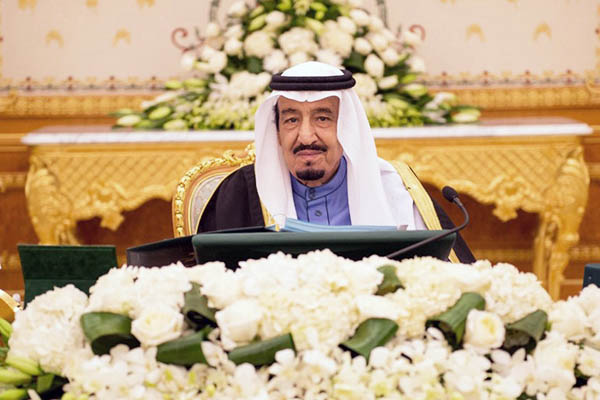
SPA—AFP
Yemeni rebels hit border town of Najran shortly after a Gulf Cooperation Council summit.
Saudi Arabia’s King Salman on Tuesday urged his fellow Gulf leaders to stand up to Iran, as Yemeni rebels backed by Tehran bombarded a Saudi border city.
Salman’s call came at a summit of Gulf monarchs in Riyadh also attended by French President Francois Hollande, who said his country was “by the side” of the Gulf’s Arab nations.
The Gulf Cooperation Council (GCC) summit came with international concern mounting over the impact on civilians of Saudi-led airstrikes targeting Yemeni rebels. In a clear reference to Iran, Salman stressed the need to confront an external threat that “aims to expand control and impose its hegemony,” risking regional stability and creating “sectarian sedition.”
Soon afterwards, the Saudi-led coalition carrying out air raids in Yemen said Shia Houthi rebels from across the border had fired on the Saudi city of Najran. Mortar bombs and Katyusha rockets hit hospitals, schools and houses, coalition spokesman Brigadier General Ahmed Assiri said. He reported injuries outside the city, but without giving details.
Artillery, tanks, helicopter gunships and fighter jets “are dealing with the situation which will not go unpunished,” he said.
Hollande, the first Western leader to attend a GCC summit, said France shared the dangers facing the region and he had come “to affirm the commitment of France to be by your side.”
The summit brought together leaders from Bahrain, Kuwait, Oman, Qatar, Saudi Arabia and the United Arab Emirates. All but Oman are in the Sunni coalition that on March 26 launched airstrikes against the rebels and their allies who have seized large parts of Yemen, including the capital Sanaa.
President Abedrabbo Mansour Hadi fled to Riyadh when the rebels advanced on his southern refuge Aden. Concern has mounted over the air campaign, which has continued despite the coalition’s announcement late last month that it was moving to a new phase.
The U.N. says at least 1,200 people have been killed in Yemen since March 19. It has repeatedly warned the already impoverished Arabian Peninsula state faces a major humanitarian crisis.
Saudi Arabia has said it is considering temporary halts in airstrikes to allow aid deliveries.
Hollande told the summit France supports coalition efforts “to ensure the stability of Yemen,” and backs Saudi Arabia’s position that talks between Yemen’s political forces must be held in Riyadh.
The Houthis reject such a proposal and Iran, which denies accusations of arming the Houthis, has called for negotiations at a neutral location.
The leaders at the summit welcomed Hadi’s decision to convene on May 17 in Riyadh a congress for “all the Yemeni parties who support the legitimacy, security and stability of Yemen.”
Hollande arrived in Riyadh from Qatar where he attended the signing of a 6.3-billion-euro deal between French aerospace firm Dassault and Qatari defense officials.
On Tuesday, French Foreign Minister Laurent Fabius said Paris and Riyadh are also discussing 20 economic projects worth “tens of billions of euros.”
Hollande’s visit came as U.S. President Barack Obama prepares to host GCC leaders for talks next week. Most GCC countries are also part of a U.S.-led coalition targeting the Islamic State jihadist group in Iraq and Syria.
Security was high in Riyadh after I.S. threats to attack the kingdom. Green-bereted Royal Guards manned checkpoints, and a sniffer dog checked vehicles entering the Diriyah Palace summit venue.
Both Paris and Washington have also sought to reassure the Gulf states about an international accord being finalized over Iran’s nuclear program.
Gulf states fear Iran could still develop an atomic bomb under the deal that would limit its nuclear capabilities in return for lifting crippling international sanctions. Tehran denies trying to develop a nuclear weapon.
“I know that Iran is at the heart of your preoccupations,” Hollande told the summit.
In its final statement, the GCC expressed hope that a final accord between Tehran and six major powers, including France and the U.S., would “guarantee the peaceful character of the Iranian nuclear program.” The leaders also requested that the accord “conform to all the international standards.”
